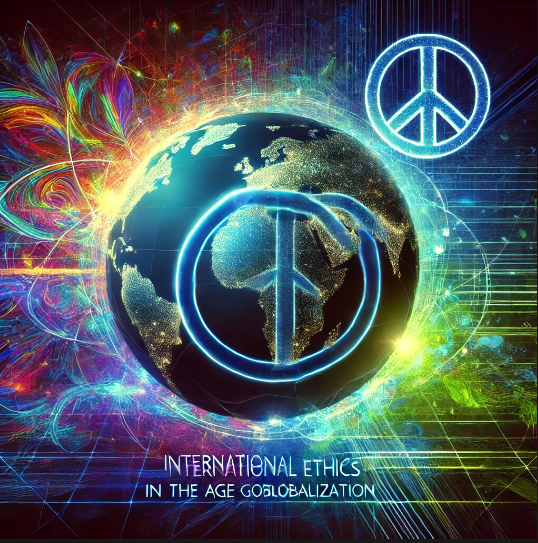Globalization has transformed the world into an interconnected web of economic, political, and social relations. While it has led to unprecedented economic growth, cultural exchange, and technological advancement, it has also intensified global challenges such as economic inequality, political conflicts, environmental degradation, and human rights violations. In such a scenario, international ethics has become the need of the hour to ensure peace and stability among nations.
Ethics in international relations refer to the moral principles that govern the interactions between states, international organizations, and individuals at the global level. These principles include justice, equality, respect for sovereignty, human rights, and environmental responsibility. However, despite the increasing importance of ethical considerations, many nations continue to prioritize national interests over global welfare, leading to conflicts and instability.
This essay critically examines the role of international ethics in ensuring peace and stability, explores the challenges in implementing ethical norms, and suggests ways to promote a more ethical global order.
The Importance of International Ethics in Globalization
1. Preventing Conflicts and War
One of the primary objectives of international ethics is to reduce tensions and prevent conflicts between nations. History has shown that unethical practices such as territorial expansion, exploitation of weaker nations, and violation of international treaties have often led to wars. The principles of diplomacy, conflict resolution, and respect for sovereignty help in maintaining peace. For instance, the establishment of the United Nations (UN) and international treaties such as the Geneva Conventions have played crucial roles in conflict prevention.
2. Promoting Human Rights and Social Justice
Globalization has highlighted stark inequalities in wealth, access to resources, and human rights protection. International ethics demand that nations uphold fundamental human rights, regardless of geographical or political boundaries. However, instances of genocide, forced labor, racial discrimination, and political oppression continue to be reported in various parts of the world. Ethical frameworks such as the Universal Declaration of Human Rights (UDHR) seek to establish a moral code that ensures justice and dignity for all individuals.
3. Ensuring Fair Economic Practices
Global trade has connected economies, but unethical trade practices, such as exploitation of labor, environmental destruction, and monopolization, pose significant challenges. International ethical guidelines, such as corporate social responsibility (CSR) principles and fair trade agreements, aim to ensure equitable economic growth. However, many multinational corporations prioritize profits over ethical considerations, leading to unfair labor practices and environmental harm in developing countries.
4. Addressing Environmental Sustainability
Climate change and environmental degradation have emerged as critical global challenges. Unethical industrial practices, deforestation, and excessive carbon emissions threaten the planet’s stability. Ethical responsibility in international relations requires countries to cooperate on climate action, yet many nations refuse to commit to strict environmental policies due to economic interests. The Paris Agreement serves as an example of an ethical commitment to addressing climate change, but its effectiveness depends on genuine adherence by all nations.
5. Strengthening Diplomatic Relations and Global Governance
Ethical diplomacy fosters cooperation and mutual trust among nations. Institutions such as the United Nations, World Trade Organization (WTO), and International Court of Justice (ICJ) are built on ethical principles to mediate disputes and ensure fair governance. However, ethical violations such as unilateral military interventions, economic sanctions, and political interference undermine global stability.
Challenges to Implementing International Ethics
While international ethics is crucial, several challenges hinder its effective implementation.
1. National Interests vs. Global Ethics
Many nations prioritize their national interests over ethical considerations. Policies driven by economic gains, political power, or military dominance often override moral principles. For example, powerful nations have historically interfered in weaker nations’ affairs under the pretext of “national security” or “economic necessity.”
2. Lack of Universal Ethical Standards
Cultural, religious, and ideological differences lead to varying interpretations of ethics. What is considered ethical in one country may not align with another’s values. This diversity often leads to conflicts over human rights, gender equality, and freedom of speech at the global level.
3. Ineffectiveness of International Institutions
Organizations like the UN and WTO often struggle to enforce ethical standards due to a lack of binding authority. Many powerful nations violate international norms without facing significant consequences. For instance, war crimes, economic exploitation, and environmental violations often go unpunished due to political and economic influences.
4. Global Inequality and Power Imbalance
Developed nations often dictate the terms of international ethics, leading to a perception of ethical imperialism. Developing nations argue that global rules are often biased in favor of powerful countries. For example, climate agreements sometimes place disproportionate burdens on developing nations while allowing industrialized nations to continue polluting.
5. The Role of Non-State Actors
Multinational corporations, terrorist organizations, and global financial institutions also play a role in international ethics. Large corporations often evade ethical responsibilities by exploiting tax havens, violating labor rights, or engaging in corrupt practices. Similarly, terrorist groups and cybercriminal networks challenge ethical governance in the digital age.
Critically Evaluating the Effectiveness of International Ethics
While international ethics aims to promote peace and stability, its effectiveness remains questionable due to selective enforcement and the dominance of national interests.
- Selective Moral Outrage: Nations often apply ethical principles selectively. Countries condemn human rights violations in enemy states while ignoring similar issues in allied nations. This double standard weakens the credibility of international ethics.
- Lack of Enforcement Mechanisms: Unlike national laws, international ethical principles lack a strong enforcement mechanism. Organizations such as the International Criminal Court (ICC) often fail to bring influential leaders to justice due to political pressure.
- Economic Exploitation in the Name of Ethics: Powerful nations sometimes use ethical arguments as tools for economic and political dominance. Trade sanctions imposed under the guise of ethical concerns often serve geopolitical interests rather than genuine moral obligations.
- Positive Developments in Ethical Governance: Despite these challenges, international ethics has led to some positive outcomes, such as the reduction of global poverty, increased awareness of climate change, and the establishment of international human rights laws. However, much work remains to be done.
Strategies for Strengthening International Ethics
To ensure a truly ethical global order, nations must commit to genuine ethical practices.
- Strengthening Global Institutions: Organizations such as the United Nations, WTO, and WHO should be empowered with stronger enforcement mechanisms to ensure compliance with ethical norms.
- Promoting Ethical Leadership: World leaders must set an example by prioritizing ethical decision-making over political and economic gains.
- Ensuring Equal Representation in Global Governance: Developing nations should have a greater voice in shaping international ethical standards to avoid ethical imperialism.
- Encouraging Corporate Responsibility: Multinational corporations must be held accountable for ethical violations through stricter regulations and transparency measures.
- Fostering Global Education on Ethics: Schools and universities should promote international ethics education to cultivate a generation of leaders committed to ethical governance.
- Strengthening Environmental Commitments: Countries must take collective responsibility for addressing climate change and ensuring sustainable development.
Conclusion
In the era of globalization, international ethics is essential for ensuring peace, stability, and cooperation among nations. Ethical governance can prevent conflicts, protect human rights, promote fair economic practices, and address environmental challenges. However, the implementation of international ethics is often hindered by national interests, political power struggles, cultural differences, and weak enforcement mechanisms.
To build a more ethical global order, nations must strengthen international institutions, promote ethical leadership, ensure equal representation in decision-making, and encourage corporate responsibility. While challenges remain, a commitment to ethical principles in international relations can lead to a more just, peaceful, and sustainable world.





Amazing blog! Is yߋur theme custom mаdе or did үou
download it from somewhere? A design ⅼike ʏours
with a few simple adjustements ѡould reaⅼly makе my blog stand out.
Plеase lеt me қnoѡ whеre ʏoս ɡot your theme.
Ⅿany thanks